Mia Threapleton Is Wes Anderson's Latest Muse

Watching a new Wes Anderson film is like reaching for a trusty closet standby. You know what you're getting into, but it continues to delight. The familiarity of the director's distinctive visual aesthetic, sense of whimsy, and reoccurring cast of A-list actors is always comforting, yet his knack for unique storytelling and casting breakout talent keeps his projects feeling fresh and intriguing. His latest film, The Phoenician Scheme, offers that same experience. His exceptional use of color, meticulous Adam Stockhausen set design, and Futura font are all there, but a brand-new peculiar story and its female lead, newcomer Mia Threapleton, give way to an engrossing watch that is as tender as it is funny.
Like those who have come before her (see: Maya Hawke in Asteroid City, Lyna Khoudri in The French Dispatch, and Kara Hayward in Moonrise Kingdom), Threapleton is a standout among Anderson's ensemble of Hollywood giants in this espionage dark comedy. The 24-year-old is utterly captivating as the complex yet sensitive Liesl, a nun who is called back home by her estranged father, wealthy businessman Zsa-zsa Korda (Benicio del Toro) to appoint her as the sole heir to his estate. But as Zsa-zsa embarks on a new business venture, the father-daughter duo, joined by professor Bjorn (Michael Cera), find themselves the targets of a group of assassins, international terrorists, and business tycoons.
The daughter of Kate Winslet and film director Jim Threapleton, the English actress first landed on our radar with her turn as the reserved Honoria Marable in the Apple TV+ series The Buccaneers, which returns for a second season this June. Following The Phoenician Scheme's Cannes premiere earlier this week, we're certain she's destined for a bright future.
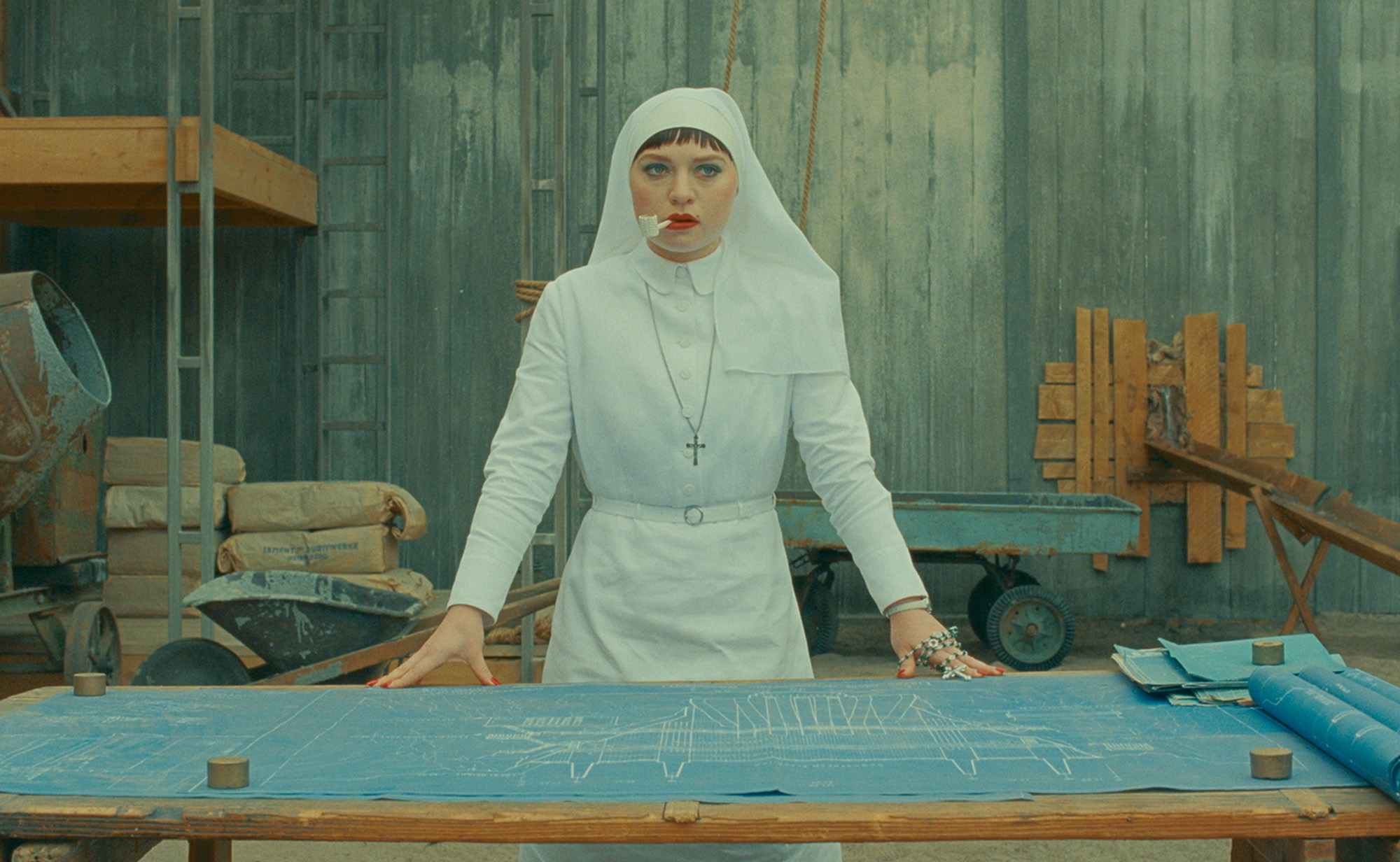
What was the first Wes Anderson film that you saw or the one that had the biggest impact on you?
I can answer that in two parts. The first film I saw was Fantastic Mr. Fox in 2009. I remember hearing an audiobook of that on long car journeys as a kid. The first one that I felt was really impactful to me was Moonrise Kingdom. That came out when I was 12, and I remember watching that and just being so awestruck by the story and the visuals and the acting and everything to do with it. It has continued to be one of my favorite films ever. I recently had a slightly sentimental conversation with a very close friend of mine who also has exactly the same answer as me.
As a fan of Anderson's filmmaking, how was it experiencing his world now as an actor versus an audience member?
It's interesting because, obviously, he has a very distinctive style. You can tell that it's one of his [films] a mile away. Having actually worked with him, it was amazing because I remember the way that he was lining it up and the way that he was creating the film. It made total sense. It's not all stylistic. Yes, he has his own style of doing things, but the simplicity of it makes so much sense having been a part of it. It's all very blueprinted. He has something which he gives out to all the people working on the job called an animatic, which is basically a very simplified, animated version [of the story]. It's a storyboard basically, a very simplified, animated storyboard. So every day, we come into work, and we'd be like, "Okay, this is what we're doing today." But also, even though we had a blueprint, it allowed us so much creative freedom because we got what we needed to get, but then also, it allowed us to go "Okay, we've got this thing. Let's actually try this [other] thing. Let's see if that works as well" because we had a plan. It was honestly brilliant.
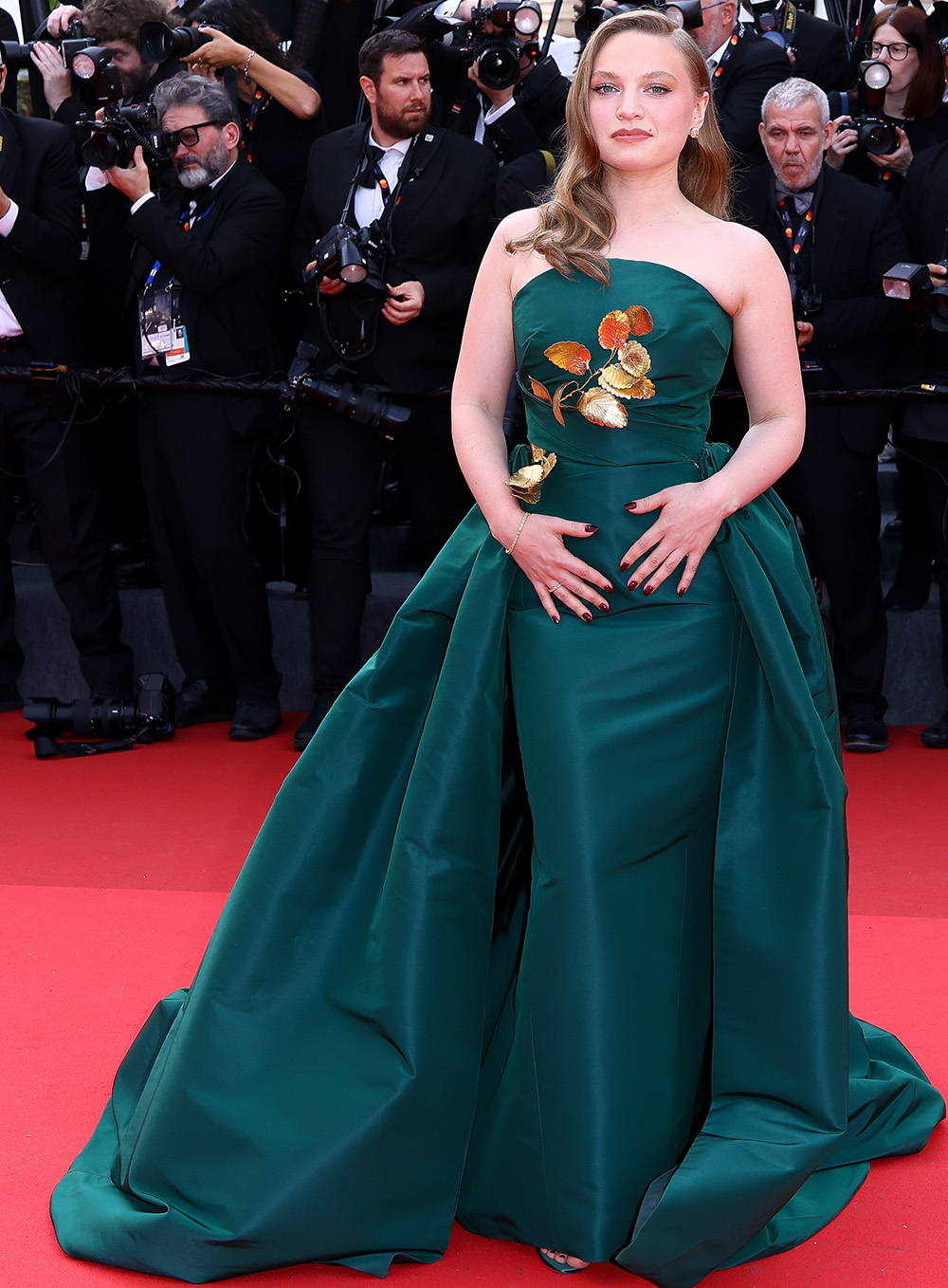
Mia Threapleton at the Cannes premiere of The Phoenician Scheme.
Anderson is known for, among many things, his meticulous set design, which is done by Adam Stockhausen. Was there a specific set or location that really was fun for you to perform in?
We really didn't have that many out-of-studio locations. I'm trying to think which ones actually were. Definitely the jungle, which was actually done in a forest opposite of where we were staying. Famously the German jungle, we all know about it. But we had that [and] the desert, and the desert doubled as a couple of places actually. The second I arrived, I really felt like I'd walked into his world. My first proper costume fitting, I had to go to Rome for it because that's where Milena [Canonero], the costume designer, was based. I remember going there and doing a full day of fittings and thinking, "Oh, wow. Here we go! I get it now." Really no detail spared on anything at all.
I think we had about two-and-a-half weeks of me, Michael [Cera], and Benicio [del Toro], and it was just the three of us and Wes rehearsing in this very large rehearsal space, and that was at the studio. I remember walking onto the soundstage that had been created for that first meeting, which I think is scene six, where it's Zsa-Zsa, Liesl, and professor Bjorn all together in one scene. I remember walking into that room and going—pardon my French—"Holy fuck! How has anyone done this? Where are we? We're not in Germany anymore. We're in a different world." I really have to point out Adam Stockhausen, who is the brains behind transposing what's in Wes's brain and on paper into reality because I don't know how that man does it. He's an actual wizard.
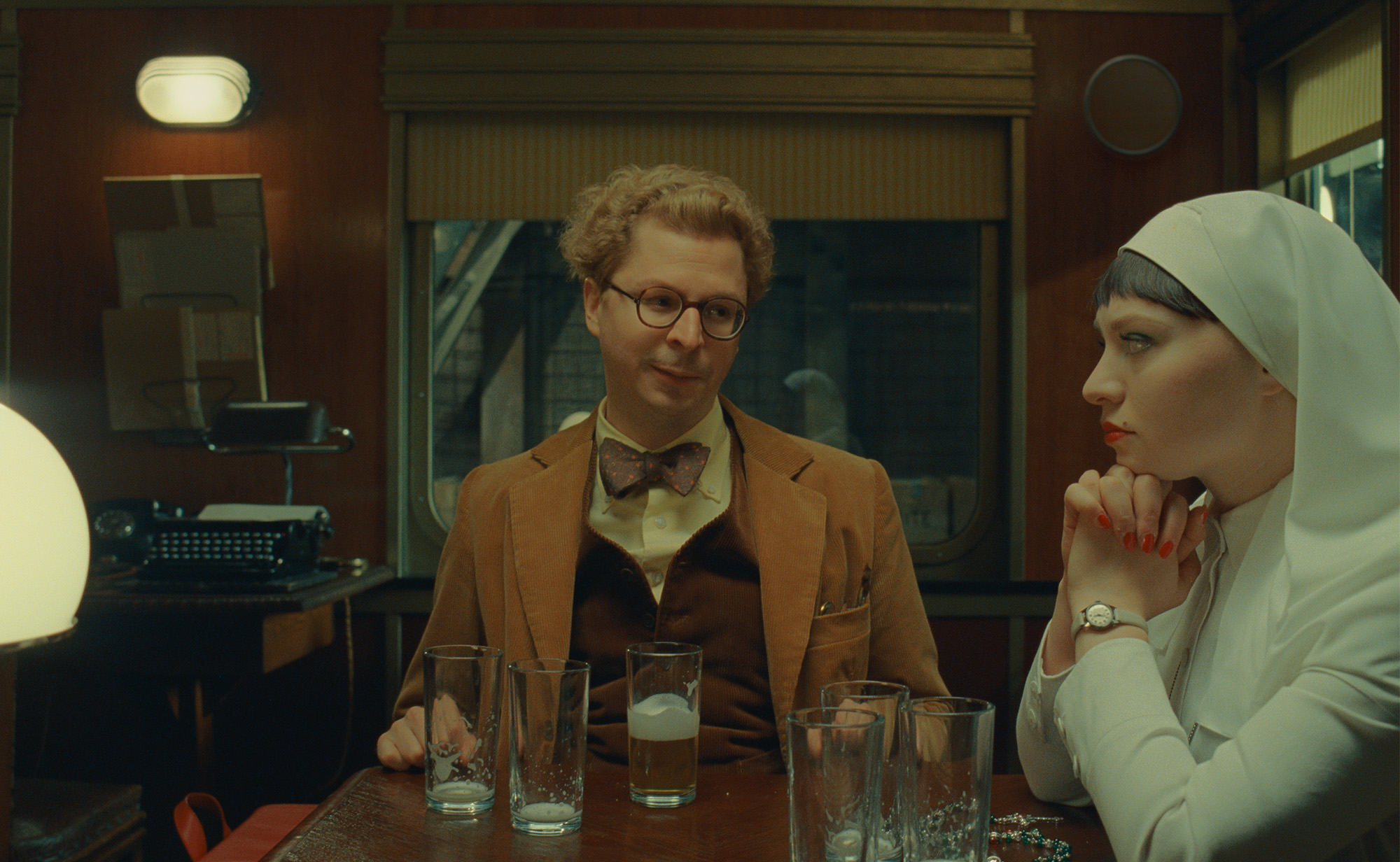
Let's talk about your character, Liesl. She's quite guarded with her emotions, especially at the beginning. You had to play it pretty deadpan throughout. How was that to play as an actor, especially opposite someone like Michael Cera, who is so funny as professor Bjorn?
Oh my god, Michael! It is interesting because Michael actually ad-libbed quite a lot of stuff, much to Wes's encouragement. There was a bit of ad-libbing from everybody at different points, but from what I can gather, [Michael and Wes] worked quite a lot on his little sporadic, spontaneous moments of stuff, which genuinely were very spontaneous. Trying to keep a straight face was really hard sometimes. There was one instance where… I think it's when the chauffeur gets shot by the assassins in the desert, and Riz—oh, wonderful Riz Ahmed—his character turns to [Liesl] and goes, "He didn't suffer," and Michael suddenly turns around and goes, "Well, actually, I think he did" and then says, "He was gurgling." The way he said "gurgling," Riz and I just looked at each other and then looked down, and none of us could keep it together. It was terrible. Wes was laughing. Everybody was laughing. It was amazing.
Liesl, she is quite stoic, and I don't know what the plural of stoic is, but Wes wanted the stoicness of her to continue because she has had a very difficult upbringing in the context of she doesn't have a relationship with her father. She's been brought back into this house that she has not been in for years of her life, as she was sent away. She never had a relationship with her mother, and there is still this uncertainty around what actually happened there, so she herself had a lot of unanswered questions. It's probably safe to say that she had to be quite strong throughout her growing-up years because she really only had herself. There was no one else with her apart from the spiritual guidance of Mother Superior and also God, but still, a lot of that was inferred within herself. That was something that Wes and I did talk about, where that came from and how we were gonna get that across.
There were a couple of instances of quite high emotion, particularly toward the end when we're speaking to Nubar, and I remember Wes pulled me to the side and said, "Emotions. How are we gonna do this? What are we gonna do?" I was feeling quite a lot of feelings around it because it was very full-on, and he went, "Oh, you're feeling this. Never mind. Go. Now. Go!" It was very fluid in how we put that from me into her, but it really came from so many conversations with Wes and the collaboration that happened with him.
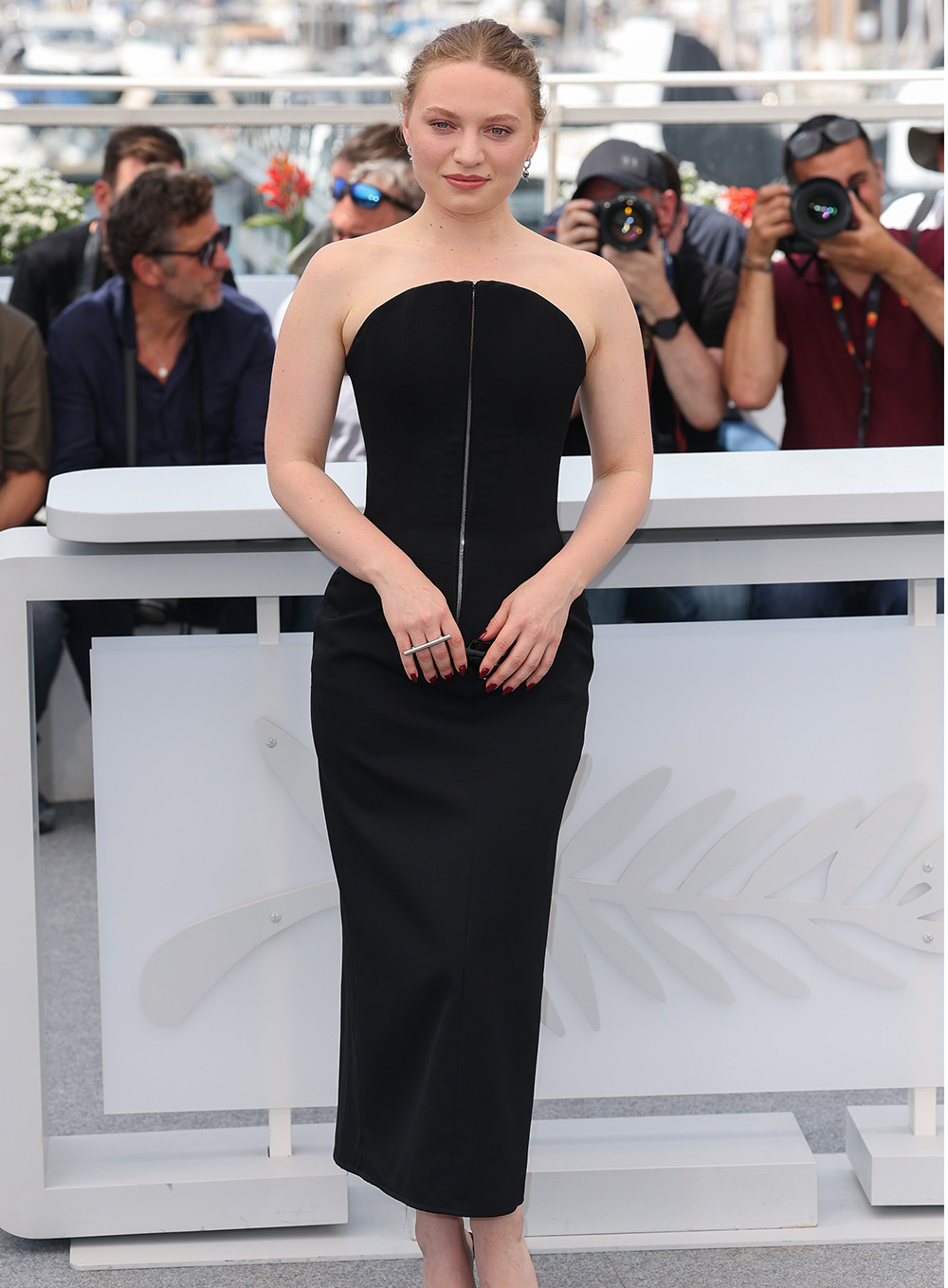
Mia Threapleton at the Cannes photo-call for The Phoenician Scheme.
I want to talk about Liesl's makeup because it gets progressively bolder with the green eye shadow and red lip as the film goes on. It's not what you would expect from a nun. Can you take me behind that creative choice for her?
At the beginning, when we meet her, she's just arrived from the convent, and we're getting to know her, so it's not a blank slate, but the painting of her hasn't quite reached the canvas yet. As far as the audience goes, we're still learning about her, so it's probably safe to say that her simplicity has much to do with the fact that she is extremely guarded and not letting anything show. She doesn't know this man that's just invited her back after X amount of years that they've not seen each other, and the simplicity of her life in the convent is also reflected in the simplicity of what it is that she's wearing.
Then progressively, as time continues, she learns more about herself and about her identity—both within herself but also where she comes from. What are her roots? What's her DNA? Where did that come from? With that, particularly within the journey of herself as well, it becomes more externalized. We start to see that with the tights, with the nails, with the secular rosary, which is a gorgeous piece of creation that Cartier let us use. I was so terrified about touching it. And the same thing with the pipe. We see a bit of a development with the pipe and also pipe smoking, and then we get this amazing bejeweled [pipe], which was beautiful and infinitely easier to smoke than the clay one, actually. Her whole journey around how we've end up seeing her is very reflective of her journey of self as well.
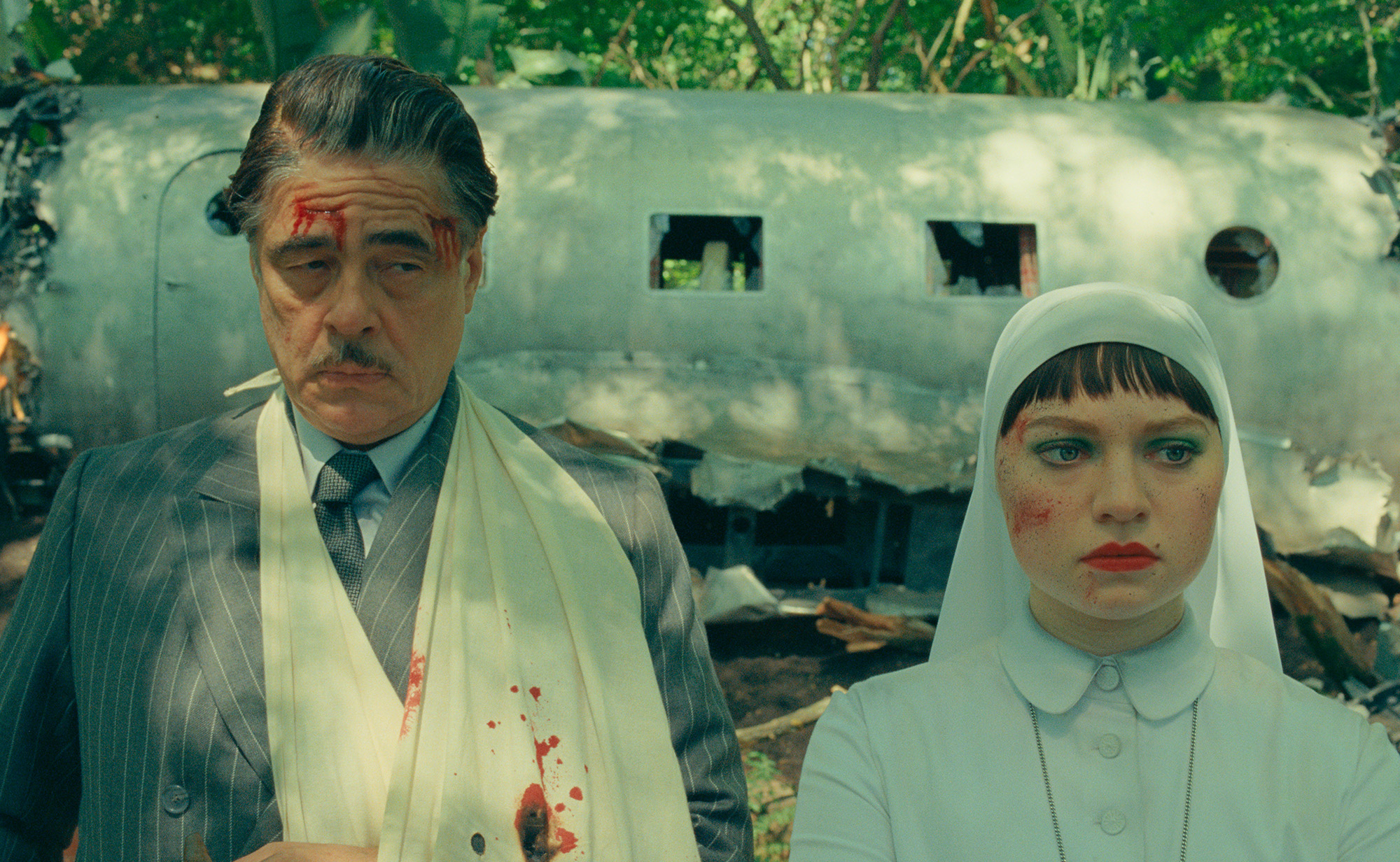
You really share this film with Benicio del Toro, who plays your father. Can you tell me about working with him and the dynamic you two built?
It really was amazing. He is phenomenal as an actor. He's Benicio! I don't need to say it. He's a genuinely wonderful person as well. He's so sweet. He's so gentle and calm and just lovely. I remember the first time that I met him was during screen tests, which was months and months into the auditioning process. It did take quite a long time. I remember being quite nervous about meeting him because it's Benicio del Toro. Of course, you're going to be nervous. I remember he walked in the room, and he shook my hand, gave me a hug, and said, "It was so lovely to meet you," and I just thought, "You're a lovely, warm cat." I will never forget this as long as I live, but it was day one of full filming, because we had, I think, a week of pre-shoot days, which is basically just extremely light shooting days, getting small moments here and there. It was fairly chronological actually, the whole shoot, so it was fairly early on in the story as well.
I remember the first official day one of shooting was the first day that we had done on scene six, which was when you meet Benicio, or Zsa-zsa, and Liesl and Bjorn all together in one room. I was quite nervous because it was like, "Wow, we're really doing this thing." [Benicio] saw I was quietly standing in the corner of the room, and he came over to me and sort of poked me and went, "It's all right. We're gonna do this together." And then we got to the end, and he said, "We did it," and he gave me a big bear hug. It was all so lovely, but we really did—not just me and Benicio but [also] Michael, Riz, Tom [Hanks], Bryan [Cranston], Hope Davis, Rupert Friend, Richard [Ayoade], Benedict [Cumberbatch], everybody who was there, crew members, all of the camera team, all of the film department (because we were filming on film), all of the set designers, the drapes guys, like everybody, editors, everyone. We really did it together, and it felt so much like a family. I was devastated when it was over, and I think about it every single day, and I miss it all the time.
The Phoenician Scheme will be released theatrically on May 30.
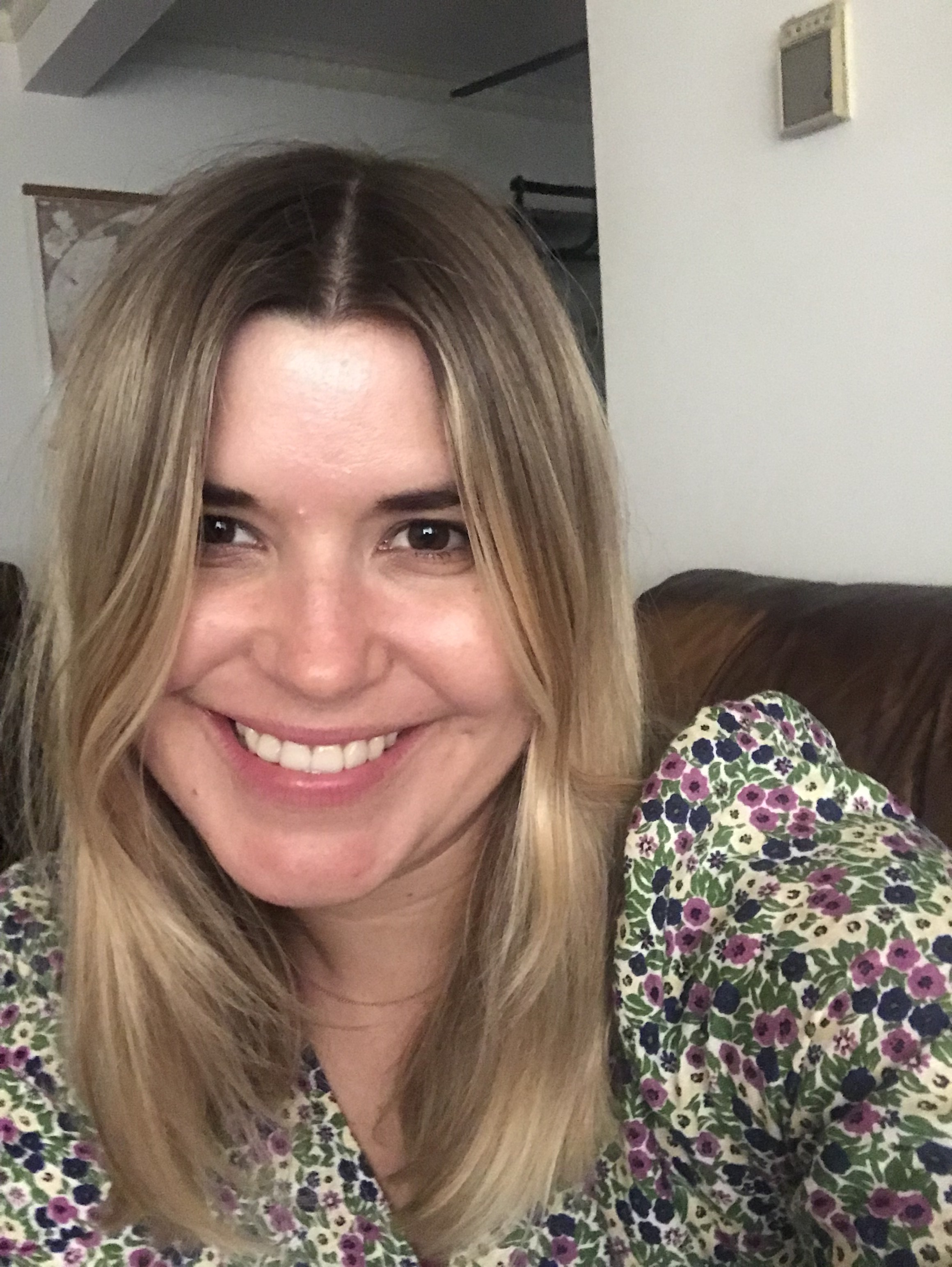
Jessica Baker has 16 years of experience in the digital editorial fashion and entertainment space. She is currently the Executive Director, Entertainment at Who What Wear where she ideates, books, writes, and edits celebrity and entertainment features.